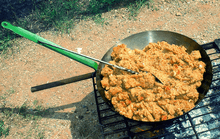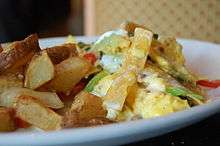Migas
|
Migas Manchegas | |
| Alternative names | Migajas |
|---|---|
| Course | Appetiser |
| Place of origin | Iberia |
| Serving temperature | Warm |
| Main ingredients | Bread |
|
| |
Migas (Spanish pronunciation: [ˈmiɣas]) ("crumbs" in English) is the name used for an ancient dish in Spanish and Portuguese cuisines.
The same name is used for a different dish in Mexican and Tex-Mex cuisines.
Iberian migas
Spanish migas
Migas is a traditional dish in Spanish cuisine. Originally a breakfast dish that made use of leftover bread or tortas, today migas is a fashionable first course served for lunch and dinner in restaurants in Spain.[1]

The ingredients of migas vary across the provinces of Spain. In Extremadura, this dish includes day-old bread soaked in water, garlic, paprika, and olive oil, and contains spinach or alfalfa, often served with pan-fried pork ribs.[2][3] In Teruel, Aragon, migas includes chorizo and bacon, and is often served with grapes.[4]
In La Mancha, migas manchegas is a more elaborate preparation using basically the same ingredients as Aragonese migas.[5]
There is also a dish named migas related to couscous that uses flour and water, but no bread, and can be found in Andalusia.[6][7]
Portuguese migas
Migas is also a traditional dish in Portuguese cuisine. It is usually made with leftover bread, either wheat bread traditionally associated with the Alentejo region in Southern Portugal, or corn bread as used in Beira. In Alentejo migas can also be made with potatoes (Migas de Batata) and no bread is included.
Garlic and olive oil are always an ingredient. Other ingredients such as pork meat drippings, wild asparagus, tomato, and seasonings such red pepper paste and fresh coriander are usually included in Alentejo, while in Beira the other ingredients typically are cooked kale cut in caldo verde style, cooked beans (pinto or kidney beans) and sometimes cooked rice.
Migas usually accompanies meats or other main dishes.
North American migas
Mexican migas

In different areas of Mexico, migas is a traditional breakfast dish consisting of corn tortilla strips fried on a pan or griddle until almost crispy and then eggs are added to create a scrambled egg/fried tortilla mixture. It is a traditional breakfast created due to the low-cost availability of eggs and the custom of buying small batches of corn tortillas daily. This made leftover corn tortillas from one day's lunch and dinner the next day's breakfast, but since day-old tortillas harden, they were best when cooked in oil along with other ingredients. The same reasoning gave rise to chilaquiles which is a similar meal, substituting salsa for eggs during cooking. Both are hearty, inexpensive and a traditional working-class breakfast meal.
Mexico City migas
Mexico City also has its own version of migas. It is a garlic soup which is thickened with sliced day-old bolillos. It is usually flavored with pork shanks, ham bones, epazote, oregano and different types of dried chillies. A raw egg is usually added to each plate when served and it is slowly cooked by the warm soup, similar to egg drop soup. It is a very popular dish in fondas around downtown Mexico city, especially in Tepito.[8]
Tex-Mex migas
There is also a Tex-Mex variation of Mexican migas. This includes additional ingredients, such as diced onions, sliced chile peppers, diced fresh tomatoes, or cheese, as well as various spices and condiments (e.g., salsa or pico de gallo).
Migas is typically served with refried beans, and corn or flour tortillas may be used to enfold all of the ingredients into tacos. In some areas, it may have been traditionally eaten during Lent.[9]
Another common variation is to add chorizo to the standard ingredients.
See also
- Acquacotta
- Panzanella
- Gachas
- Torta de gazpacho
- Chilaquiles, another Mexican dish based on cooking tortillas
- Matzah brei, a somewhat similar Ashkenazi breakfast dish in which matzoh is used instead of tortillas
- Kothu Parotta, a somewhat similar dish popular in the South Indian state Tamil Nadu
- French toast
- List of Portuguese dishes
- Sandwiches de miga, Argentine sandwiches, of which miga refers to the crustless bread
References
- ↑ Barrenechea, Teresa (2005). The Cuisines of Spain. Ten Speed Press. p. 132. ISBN 1-58008-515-6.
- ↑ Migas extremeñas
- ↑ Migas de Cáceres
- ↑ Migas de Teruel
- ↑ Migas manchegas
- ↑ Andalusian migas is often eaten with sardines as a tapa, in the form of fried breadcrumbs. In some places the dish is eaten on the morning of the matanza (butchery) and is served with a stew including curdled blood, liver, kidneys, and other offal, traditionally eaten right after butchering a pig, a sheep or a goat. Migas is often cooked over an open stove or coals. In Almeria, migas is traditionally made when it rains. "Migas de harina de Almería" (in Spanish). 19 August 2000. Retrieved 2013-03-24.
- ↑ "Migas de Harina" (in Spanish). 7 November 2011. Retrieved 2013-03-24.
- ↑ Migas del Tepito gourmet - Filemón Alonso Miranda - Urbanitas 14 de diciembre de 2008
- ↑ Amaya’s Migas
External links
 Media related to Migas at Wikimedia Commons
Media related to Migas at Wikimedia Commons- Recipe for Tex-Mex migas
- Traditional recipe of migas. Take a taste of Andalucia, Spain
